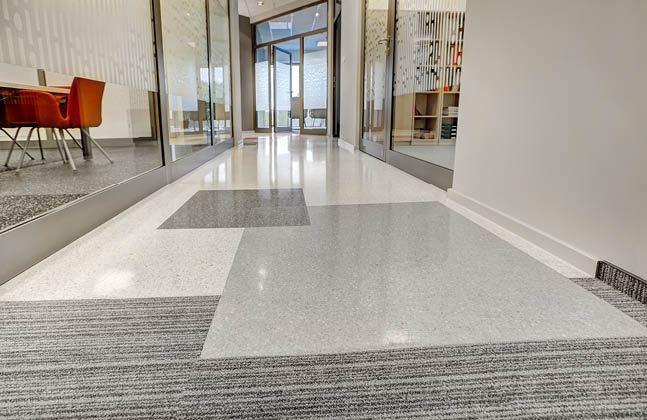A spike in commercial flooring projects has resulted from increased building investment and urban expansion. As buildings age, company owners and property managers redesign worn surfaces to increase productivity, decrease workplace accidents, and reduce maintenance and repair costs. While cost is usually a major concern when determining which commercial flooring alternatives are appropriate for a project, function and visual appeal are also important considerations.
With so many alternatives, how do you know which type of business flooring would best suit the needs of your space? To help you make an informed decision, we’ll look at the benefits and drawbacks of commercial timber flooring like vinyl, hardwood, and laminates along with epoxy and carpet flooring in this article.
Vinyl
Vinyl is a synthetic material that may mimic the appearance of hardwood or stone without the maintenance. This moisture-resistant surface is less expensive than other forms of flooring, however, tiles can become pierced or damaged in specific situations. Vinyl flooring can fade over time, especially in places prone to UV exposure. If you decide to change this sort of flooring, removal can be difficult and costly because the tiles are glued together.
Hardwood
While solid wood flooring can endure longer than other forms of industrial flooring, it is far more costly and requires a lengthier installation period. However, wood flooring has an appealing appearance and can be readily wiped and swept away. Humidity can be a concern with hardwood flooring. Surface cracks, cupping, crowning, and buckling can develop, while moisture and leaks beneath the surface can also cause issues.
Laminates
Laminate wood flooring is designed to be long-lasting, sanitary, and simple to care for. The fact that this sort of flooring is generally waterproof is one of its advantages. LEED-certified buildings may have laminate floors. While laminate flooring is less expensive than hardwood floors, it can be harder to restore if they become damaged.
Epoxy
Epoxy flooring has seen some of the most rapid development in the concrete flooring business. Epoxy is increasingly being used in commercial contexts as it is very resistant to wear and tear as well as other typical abrasions and can be adjusted to the demands of space. Epoxy is a common choice for high-performance applications since it can provide chemical and heat resistance as well as excellent UV stability.
Carpet
Carpet is perhaps the most classic choice in various business settings since it adds warmth in colder areas and absorbs noise. On the other hand, it is readily discolored and destroyed, and harmful chemicals are generated throughout the production process. While dirt and other debris may be quickly wiped away from any other floor, allergies frequently become trapped in carpet strands. If the carpet is exposed to extreme moisture, it may need to be removed, especially if mold and mildew grow.
Because each business area is unique, you should carefully evaluate the demands of your organization before accessing a custom flooring solution. Taking expert guidance can help with how to get the most out of your space while maximizing your budget and decreasing downtime at every stage of your project while providing you with the flooring you require.

